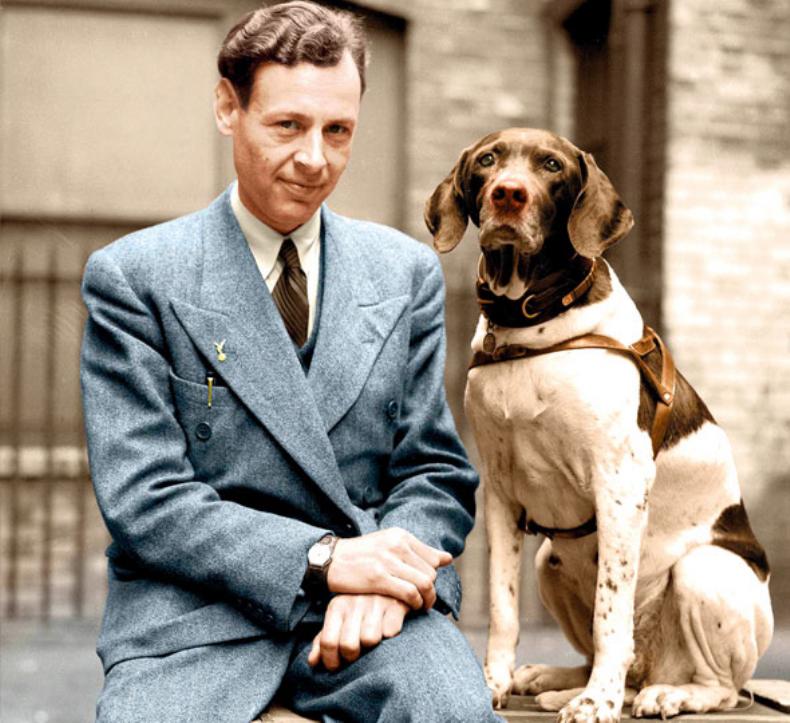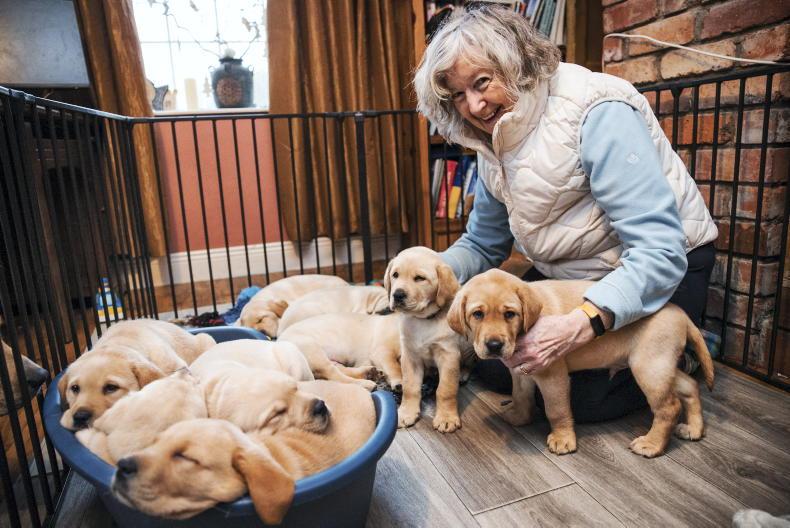The suffering was almost beyond bearing. Thousands of prisoners – mainly British, Australian and Dutch – forced by the Japanese to work in Sumatra; battling not only cruel guards, but malnutrition and disease.
Incredibly, those who made it to liberation day were helped greatly by an unusual motivating force: Judy, a purebred liver and white pointer.
Judy was born in 1936 in the Shanghai Dog Kennels, and went on to become a ship’s mascot, serving on board the gunboat HMS Gnat, which was part of the British defence fleet in the Far East. Blessed with the acute sense of hearing, her first life-saving act was to detect two shiploads of river pirates.

Judy with Frank Williams in London in 1948.
Years later, Judy transferred to the gunboat HMS Grasshopper, which in 1942 was attacked by Japanese aircraft, forcing those on board to abandon ship and head to the nearest land. Marooned for two days without food or water, Judy’s instincts saved the lives of her compatriots when she managed to unearth a fresh-water spring.
Everyone then embarked on a 200-mile cross-country trek in an attempt to reach Padang, the capital of West Sumatra province. Alas, the group missed the last evacuation ship, and with the arrival of the Japanese, were taken into custody as prisoners of war.
Thus began over three years of torture, starvation and degradation. Yet through the trauma, Judy was there to protect them and even raise their spirits.
Registered as a prisoner of war (POW)
In August 1942, Judy met aircraftsman Frank Williams. The young Brit shared his meagre rice ration with Judy and from that moment onwards, she never left his side. Judy was a comfort to all the prisoners, but the Japanese guards were increasingly hostile towards her. Williams, however, convinced Colonel Banno, the camp’s Japanese Commandant, to register her as an official POW promising him one of Judy’s future puppies in return.
Despite the mystery over the father’s identity, there was great joy among the prisoners
And indeed, in November 1942, a miracle happened – Judy had a litter of puppies! Despite the mystery over the father’s identity, there was great joy among the prisoners. As promised by Williams, one of the pups was given to the camp Commandant.
Later, Colonel Banno was transferred and a Captain Nishi arrived. He hated dogs and immediately issued strict instructions: the men were moving, but Judy was to be left behind. However, there was no way the prisoners were going to abandon Judy. As they were about to be transferred aboard the SS Van Waerwijck, Williams managed to teach Judy to lie still and silent inside a rice sack, which he slung over his shoulder to take on board.
Below deck, a desperate Frank Williams pushed Judy out through a porthole, before making his own escape
Regretfully, on 26 June 1944, the ship was torpedoed by a British submarine, who were unaware the vessel was transporting allied prisoners of war. Below deck, a desperate Frank Williams pushed Judy out through a porthole, before making his own escape. He was lucky; over 500 passengers did not survive.
Magnificent courage
For more than two hours, Williams swam in the oily, burning water, searching for her. Suddenly, something hit him square between the shoulders. It was Judy. Survivors told how they had seen her swimming to the foundering men, guiding them to floating pieces of the wreckage. She also brought people ashore by letting them hold onto her body.
Judy had one more bit of luck when she reached the docks: Captain Nishi saw her being hoisted onto a truck and ordered her to be dropped into the sea. Suddenly, a loud voice over-ruled him – it was Colonel Banno. Hence Judy was lowered to safety.
For one last time Judy was a stowaway
Over the next year, Judy and Frank were shunted from camp to camp as the prisoners were used to lay 3,000 miles of railway track through the jungle. Afterwards, Williams said that every day he thanked God for Judy because she gave him a reason to keep living.
Although victory over Japan was celebrated on 15 August 1945, transport home was taking time to organise. Frank’s thoughts were already turning to the final challenge – smuggling Judy home on the troop ship – as a notice on the gangway read: “No animals allowed.” For one last time Judy was a stowaway.
In May 1946, Judy was awarded the PDSA Dickin Medal – the animal’s Victoria Cross – “for magnificent courage and endurance in Japanese prison camps, which helped to maintain morale among her fellow prisoners and also saving many lives through her intelligence and watchfulness”.
Read more
Sergeant Stubby: the most-decorated dog of WWI
The brave and loyal old Sea Dog of the Norwegian Navy
The suffering was almost beyond bearing. Thousands of prisoners – mainly British, Australian and Dutch – forced by the Japanese to work in Sumatra; battling not only cruel guards, but malnutrition and disease.
Incredibly, those who made it to liberation day were helped greatly by an unusual motivating force: Judy, a purebred liver and white pointer.
Judy was born in 1936 in the Shanghai Dog Kennels, and went on to become a ship’s mascot, serving on board the gunboat HMS Gnat, which was part of the British defence fleet in the Far East. Blessed with the acute sense of hearing, her first life-saving act was to detect two shiploads of river pirates.

Judy with Frank Williams in London in 1948.
Years later, Judy transferred to the gunboat HMS Grasshopper, which in 1942 was attacked by Japanese aircraft, forcing those on board to abandon ship and head to the nearest land. Marooned for two days without food or water, Judy’s instincts saved the lives of her compatriots when she managed to unearth a fresh-water spring.
Everyone then embarked on a 200-mile cross-country trek in an attempt to reach Padang, the capital of West Sumatra province. Alas, the group missed the last evacuation ship, and with the arrival of the Japanese, were taken into custody as prisoners of war.
Thus began over three years of torture, starvation and degradation. Yet through the trauma, Judy was there to protect them and even raise their spirits.
Registered as a prisoner of war (POW)
In August 1942, Judy met aircraftsman Frank Williams. The young Brit shared his meagre rice ration with Judy and from that moment onwards, she never left his side. Judy was a comfort to all the prisoners, but the Japanese guards were increasingly hostile towards her. Williams, however, convinced Colonel Banno, the camp’s Japanese Commandant, to register her as an official POW promising him one of Judy’s future puppies in return.
Despite the mystery over the father’s identity, there was great joy among the prisoners
And indeed, in November 1942, a miracle happened – Judy had a litter of puppies! Despite the mystery over the father’s identity, there was great joy among the prisoners. As promised by Williams, one of the pups was given to the camp Commandant.
Later, Colonel Banno was transferred and a Captain Nishi arrived. He hated dogs and immediately issued strict instructions: the men were moving, but Judy was to be left behind. However, there was no way the prisoners were going to abandon Judy. As they were about to be transferred aboard the SS Van Waerwijck, Williams managed to teach Judy to lie still and silent inside a rice sack, which he slung over his shoulder to take on board.
Below deck, a desperate Frank Williams pushed Judy out through a porthole, before making his own escape
Regretfully, on 26 June 1944, the ship was torpedoed by a British submarine, who were unaware the vessel was transporting allied prisoners of war. Below deck, a desperate Frank Williams pushed Judy out through a porthole, before making his own escape. He was lucky; over 500 passengers did not survive.
Magnificent courage
For more than two hours, Williams swam in the oily, burning water, searching for her. Suddenly, something hit him square between the shoulders. It was Judy. Survivors told how they had seen her swimming to the foundering men, guiding them to floating pieces of the wreckage. She also brought people ashore by letting them hold onto her body.
Judy had one more bit of luck when she reached the docks: Captain Nishi saw her being hoisted onto a truck and ordered her to be dropped into the sea. Suddenly, a loud voice over-ruled him – it was Colonel Banno. Hence Judy was lowered to safety.
For one last time Judy was a stowaway
Over the next year, Judy and Frank were shunted from camp to camp as the prisoners were used to lay 3,000 miles of railway track through the jungle. Afterwards, Williams said that every day he thanked God for Judy because she gave him a reason to keep living.
Although victory over Japan was celebrated on 15 August 1945, transport home was taking time to organise. Frank’s thoughts were already turning to the final challenge – smuggling Judy home on the troop ship – as a notice on the gangway read: “No animals allowed.” For one last time Judy was a stowaway.
In May 1946, Judy was awarded the PDSA Dickin Medal – the animal’s Victoria Cross – “for magnificent courage and endurance in Japanese prison camps, which helped to maintain morale among her fellow prisoners and also saving many lives through her intelligence and watchfulness”.
Read more
Sergeant Stubby: the most-decorated dog of WWI
The brave and loyal old Sea Dog of the Norwegian Navy










SHARING OPTIONS